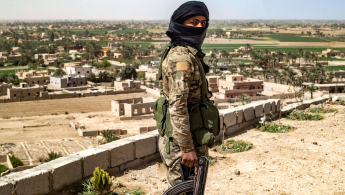Slow recovery in Syria's Baghouz two years after IS defeat
Dalal's husband was killed in a landmine explosion only months before Kurdish fighters and the US-led coalition declared the collapse of the jihadists' proto-state, known as the caliphate, in March 2019.
In the east Syria village of Baghouz, where IS fighters made their last stand, Dalal watched labourers this week pile cinderblocks and pour cement on a wall she said her husband should have built himself.
"I wish my husband was by my side," the mother of seven told AFP.
"If he hadn't died, we could have built this house together and started a fresh life," she added, only her eyes showing behind a blue face veil.
"But the war has denied me this wish."
The embattled village of Baghouz on the banks of the Euphrates River was the last vestige of the cross-border proto-state IS declared in 2014 across large swaths of Iraq and Syria.
When fighting there between the US-backed SDF forces and jihadists intensified, Dalal and her seven children fled the area and settled in the neighbouring town of Sousa, about 25 kilometres (15 miles) away.
A few months ago, Dalal returned to Baghouz for the first time since the IS caliphate crumbled, only to find that her home had been destroyed.
She did not have enough money to repair it, so relatives and acquaintances donated funds to help the family move out of their bombed out home in Sousa.
'We lost everything'
Instead of restoring her old home however, Dalal decided to use the money to finish the one-storey building where her husband had already laid the foundations, but which he did not live long enough to complete.
Twitter Post
|
She now drives from Sousa to Baghouz everyday to inspect construction work, aiming to return soon despite the lack of public services and the threat of landmines left behind by jihadists.
Walking on a sandy path towards the construction site where workers are building the walls of her new home, Dalal said her heart is heavy with grief.
"When I walk on this path, I swear I cry and cover my eyes" she said.
"We lost a lot ... not only lives, we lost our homes, we lost everything."
Two years ago, Baghouz resembled a churned up wasteland, with scorched fields and wilting pomegranate trees.
Its roads were dotted with destroyed homes.
Now, lush greenery carpets its craggy hills and residents have started to renovate battered buildings. Children have also returned to school and a handful of businesses have reopened.
But twisted metal wreckage continues to litter the ground, several homes remain abandoned and IS insignia can still be spotted on walls across the village.
On a hilltop overlooking an encampment once packed with jihadists and their relatives, the slow pace of recovery is clear.
One half of the encampment has been recultivated as a wheat field, the golden crops shimmering in the sun.
The other half looked like a desolate scrapyard littered with the charred skeletons of torched vehicles and the remains of discarded tents.
Bread queues
At one of the entrances to Baghouz, SDF fighters checked identification cards and inspected vehicles.
The security checks are meant to thwart attacks by IS jihadists hiding out in the vast Syrian desert near the Iraq border from where they plan and execute attacks.
The extremist group remains as dangerous today as when they were ousted from Baghouz two years ago, Kurdish forces warned Tuesday as they marked the anniversary of their victory.
Read also: HRW urges Syrian regime, Kurds to investigate fate of missing IS captives
The SDF said counter-terrorism efforts today were "more difficult than face-to-face fighting with IS jihadists, and are considered more dangerous".
For Abu Khaled, a Baghouz resident, anti-IS operations are not the main concern.
"Look around you ... there is no electricity or potable water," he told AFP. "We don't have enough medicine or even a hospital," the 40 year-old added.
Abu Nawras, another resident, echoed a similar sentiment even though he had just finished repairing his home in Baghouz.
The 50-year-old said the village is more secure now, but this does not make it any more liveable.
"We only have one bakery in the village," he told AFP. "I start waiting at dawn to get some bread."
Agencies contributed to this report.
Follow us on Facebook, Twitter and Instagram to stay connected





 Follow the Middle East's top stories in English at The New Arab on Google News
Follow the Middle East's top stories in English at The New Arab on Google News
![Netanyahu furiously denounced the ICC [Getty]](/sites/default/files/styles/image_330x185/public/2024-11/GettyImages-2169352575.jpg?h=199d8c1f&itok=-vRiruf5)
![Both Hamas and the Palestinian Authority welcomed the ICC arrest warrants [Getty]](/sites/default/files/styles/image_330x185/public/2024-11/GettyImages-2178351173.jpg?h=199d8c1f&itok=TV858iVg)
